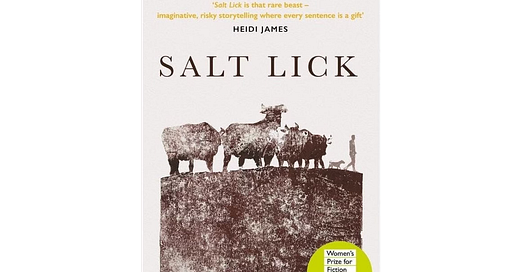Salt Lick is a work that’s at once edgy and lyrical; an empathetic and all-too-credible ‘state of the future’ novel which brings uncomfortable truths about our modern lives into sharp focus, and which wholeheartedly deserved its place on the longlist for the 2022 Women’s Prize for Fiction.
didn’t you learn?
you have the words, the stories made for learning
and yet you didn’t learn
hubris
Lulu Allison
The world-to-come that Allison depicts feels incredibly prescient, and becomes more so with each new detail she reveals. The country which she describes is beset by twin tides: waves of pandemic and rising sea levels. All food in Britain is imported, any traceability or accountability in its production eroded beyond repair, and the rural economy is in collapse. Almost the entire population lives in cities; the M25 motorway has become a ribbon shanty town beyond the circle of which only a few breakaway communities — subsistence farming collectives and insular fascist outposts — exist in the rewilded countryside where untended herds wander at will. Allison’s ruined farms and homes are heart-breaking, yet for anyone who truly deplores the harm done by humankind there is also a addictively strong allure to her descriptions of nature gradually erasing humanity’s heavy bootprint, a sense of elation in witnessing the undergrowth that surges through the shopping malls.
The story is told through time shifts across the life of Jesse, from a beguiling, anxious boyhood playing in the encroaching woods with his faithful dog, Mister, into adulthood and onward to a conclusion he could never have imagined. His life intersects with that of Isolde, a young woman in search of her past, who leaves London and finds a new home and a shocking truth in one of those isolated farming communes. As these two navigate the new normal, separately and together, their endeavours are observed by a Chorus of feral cattle, its contributions refracted searingly through the prism of bovine experience and recited in tones of deceptive placidity. Thematic cords reach forward and back, echoing both literally and figuratively the threads that Isolde learns to spin from nettle and flax. I loved Allison’s narrative drive, and although I was able to foresee its direction quite early on, my anticipation of how she would take me there only heightened my reading, and I was still plunged into furious sadness at the reveal.
I inhabited the lives of these characters, as they came to inhabit me.
Love is sacred and remains in the bones.
— Lulu Allison
As I was reading Salt Lick last spring, it was impossible not to feel that the UK was sleepwalking towards the very future that it imagined so unerringly. Too much has happened since then; things have become very much worse. Each step on the road, every disingenuous policy and promise which Allison incorporates within her tale, has the ring of aching familiarity to anyone living in Britain today and who has their eyes and ears open. Yet her novel is no polemic. In prose that is often very beautiful, rich in metaphors and entwined with respect for the land, she marks the way forward with the same weary combination of injury and fatality, hope and love, that her Chorus provides. I fear the route she has mapped, relish the circularity she proposes.
sweet child
this is not an undoing
but a remaking
measured on a pattern
older than time
— Lulu Allison
I am not a fan of dystopian fiction. Too often, the erosion of society seems to be taken as an excuse for unspeakable cruelty. But I found Lulu Allison’s compassionate world-building flawless. Writing this review has made me want to read Salt Lick all over again.
Everyone should read this book.




